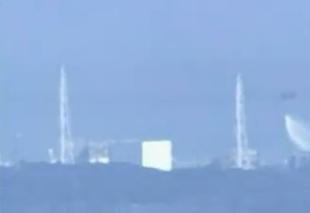Work resumed at the Fukushima nuclear power plant in an attempt to restore the reactor cooling systems damaged by the earthquake of 11 March. The six reactors at the plant now have an external power line, after laying a cable to the distributor of units 3 and 4, said the Nuclear Security Agency (NSA).
The electricity was partially restored in the control room of reactor 3, the lights have been switched, according to public broadcaster NHK. However, the cooling of reactors using water cannon has not yet resumed. The cloud emitted by the central Fukushima must arrive in the French sky Wednesday, but the risk of radioactive fallout are a priori "negligible" and have "no impact" on health, according to ASN and the Research Commission and Independent Information on Radioactivity (CRIIRAD).
Air masses containing small amounts of radioactive particles were detected as early as Tuesday night in Iceland. Japan's Nuclear Safety Agency found extremely low possibility that the pools of spent fuel and fuel rods from nuclear power to reach a new stage of "criticality". A criticality accident is an inadvertent nuclear chain reaction and uncontrolled.
"We have enough information to determine that there are no major holes or excessive release of these containments. But we still see radiation coming from that site," added International Agency of the Atomic Energy Agency (IAEA). "The question is to know where they originate: the primary containment or pools where spent fuel is stored.
Without the ability to get out there, it's difficult to determine." Andrew Graham, head of the IAEA, has bemoaned the lack of information from Japanese authorities and stressed that the overall situation remained "very serious" in Fukushima. Currently, the reactor 3, which has suffered the heaviest damage, is one of the six reactors that most worries the authorities.
It contains, in addition, MOX, mixed oxide of plutonium and uranium from recycling products, whose releases are considered more harmful than those from a uranium-based fuel. The Minister of Industry of Japan has apologized after, according to news reports, threatened to "punish" the firefighters who refused to intervene in Fukushima.
"If my words have offended firefighters (...), I apologize," said Banri Kaieda, quoted by Kyodo. Mr. Kaieda is the deputy head of the crisis chaired by the Prime Minister, Naoto Kan, trying to find solutions to series of damage to the central hilly Fukushima and avoid a major catastrophe.
See "The answers to your questions See our graphics on the scenario of catastropheSuivre special bulletins of the Japanese channel NHK, with simultaneous translation into English 


The electricity was partially restored in the control room of reactor 3, the lights have been switched, according to public broadcaster NHK. However, the cooling of reactors using water cannon has not yet resumed. The cloud emitted by the central Fukushima must arrive in the French sky Wednesday, but the risk of radioactive fallout are a priori "negligible" and have "no impact" on health, according to ASN and the Research Commission and Independent Information on Radioactivity (CRIIRAD).
Air masses containing small amounts of radioactive particles were detected as early as Tuesday night in Iceland. Japan's Nuclear Safety Agency found extremely low possibility that the pools of spent fuel and fuel rods from nuclear power to reach a new stage of "criticality". A criticality accident is an inadvertent nuclear chain reaction and uncontrolled.
"We have enough information to determine that there are no major holes or excessive release of these containments. But we still see radiation coming from that site," added International Agency of the Atomic Energy Agency (IAEA). "The question is to know where they originate: the primary containment or pools where spent fuel is stored.
Without the ability to get out there, it's difficult to determine." Andrew Graham, head of the IAEA, has bemoaned the lack of information from Japanese authorities and stressed that the overall situation remained "very serious" in Fukushima. Currently, the reactor 3, which has suffered the heaviest damage, is one of the six reactors that most worries the authorities.
It contains, in addition, MOX, mixed oxide of plutonium and uranium from recycling products, whose releases are considered more harmful than those from a uranium-based fuel. The Minister of Industry of Japan has apologized after, according to news reports, threatened to "punish" the firefighters who refused to intervene in Fukushima.
"If my words have offended firefighters (...), I apologize," said Banri Kaieda, quoted by Kyodo. Mr. Kaieda is the deputy head of the crisis chaired by the Prime Minister, Naoto Kan, trying to find solutions to series of damage to the central hilly Fukushima and avoid a major catastrophe.
See "The answers to your questions See our graphics on the scenario of catastropheSuivre special bulletins of the Japanese channel NHK, with simultaneous translation into English



- First Japanese radioactive particles reach U.S. West Coast but UN officials claim they're a 'billion times' beneath danger levels (18/03/2011)
- Residents safe: Fukushima adviser (22/03/2011)
- Fukushima explained in crap cartoon (21/03/2011)
- Fukushima's Warriors (17/03/2011)
- Taiko drummers stranded in Fukushima (21/03/2011)
No comments:
Post a Comment